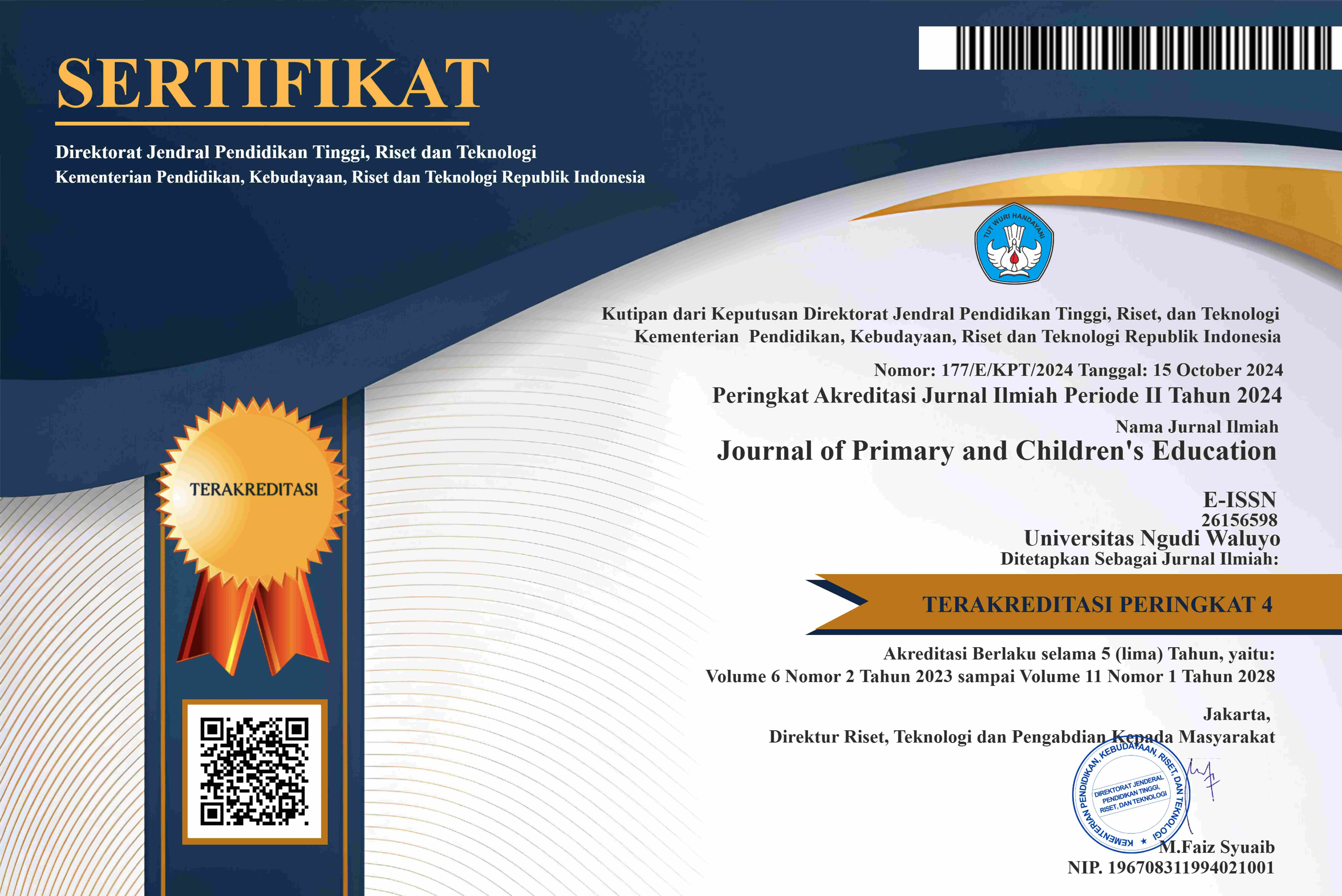KEEFEKTIFAN PBL BERBANTUAN FUN THINKERS BOOK TERHADAP KEMAMPUAN BERPIKIR KREATIF SISWA 3 SEKOLAH DASAR
DOI:
https://doi.org/10.35473/jnctt.v5i1.1597Abstract
This study aims to reveal the effectiveness of the problem based learning model assisted by the media fun thinkers book on increasing students' creative thinking skills. The design of this research is a Quasi Experiment type of Nonequivalent Control Group Design. The population in this study were students of class III SDN Sidomulyo 4 as many as 2 classes. The samples in this study were class III A and III B SDN Sidomulyo 4. The sampling technique used in this study was taken using a purposive sampling technique which is included in non-probability sampling. The data analysis techniques used were normality test, homogeneity test, independent sample t-test, simple linear regression test and paired sample t-test. The results of this study indicate that: (1) There are differences in learning using a problem based learning model assisted by the media fun thinkers book on students' creative thinking abilities with a significance of 0.001 < 0.05 using the independent sample t-test. (2) There is an effect of using the problem based learning model with the help of the media fun thinkers book on students' creative thinking abilities. This is indicated by a significance result of 0.015 < 0.05 using a simple linear regression test. (3) Improving the results of students' creative thinking skills using a problem based learning model assisted by fun thinkers book media in class III SDN Sidomulyo 4 with a significance of 0.000 < 0.05 by using the paired sample t-test. So, the key is that the problem-based learning model assisted by the fun thinker book is effective in improving the creative thinking skills of grade III students.References
Abdurrozak, R., & Jayadinata, A. K. (2016). Pengaruh Model Problem Based Learning Terhadap Kemampuan Berpikir Kreatif Siswa. Jurnal Pena Ilmiah, 1(1), 871-880.
Anjarani, A. S., Mulyadiprana, A., & Respati, R. (2020). Fun Thikers sebagai Media Pembelajaran untuk Siswa Sekolah Dasar: Kajian Hipotetik. PEDADIDAKTIKA: Jurnal Ilmiah Pendidikan Guru Sekolah Dasar, 7(4), 100-111.
Arikunto, dkk. (2006). Penelitian Tindakan Kelas. Jakarta: PT Bumi Aksara.
Febrita, I., & Harni, H. (2020). Penerapan Pendekatan Problem Based Learning dalam Pembelajaran Tematik Terpadu di Kelas IV SD. Jurnal Pendidikan Tambusai, 4(2), 1425- 1436.
Fitroh, A. (2020). Pengembangan Media Fun Thinkers Book (FTB) pada Subtema Keragaman Suku Bangsa dan Agama di Negeriku Kelas IV SD (Doctoral dissertation, STKIP PGRI Sidoarjo).
Hagi, N. A., & Mawardi, M. (2021). Model Problem Based Learning untuk meningkatkan keterampilan berpikir kreatif siswa Sekolah Dasar. Edukatif: Jurnal Ilmu Pendidikan, 3(2), 463-471.
Kurniawati, N. (2018). Mengakses Dan Memonitor Kemampuan Berpikir Kreatif Matematis Siswa Kelas V Sekolah Dasar Dalam Pembelajaran Matematika. Jurnal Prisma, VII (1).
Marsali, A. (2016). Peningkatan Pembelajaran Tematik Terpadu Dengan Menggunakan Model Problem Based Learning Di Kelas IV Sekolah Dasar. e-Journal Pembelajaran Inovasi, Jurnal Ilmiah Pendidikan Dasar, 1(1).
Ramadhan, R. T., & Saud, A. M. (2017). Penggunaan Model Problem Based Learning Untuk Meningkatkan Aktivitas Belajar Siswa Pada Sub Tema Keberagaman Budaya Bangsaku. Pendas: Jurnal Ilmiah Pendidikan Dasar, 2(1), 135-153.
Riani, R. P., Huda, K., & Fajriyah, K. (2019). Pengembangan Media Pembelajaran Tematik “Fun Thinkers Book†Tema Berbagai Pekerjaan. Jurnal Sinektik, 2(2), 179.
Sukestiyarno. (2016). Olah Data Penelitian Berbantuan SPSS. Semarang.
Vera, M., Mawardi, M., & Astuti, S. (2019). Peningkatan Kreativitas Dan Hasil Belajar Siswa Melalui Model Pembelajaran Problem Based Learning Pada Kelas IV SD N Sidorejo Lor V Salatiga. Maju: Jurnal Ilmiah Pendidikan Matematika, 6(1).
Yanti, A. H. (2017). Penerapan model problem based learning (PBL) terhadap kemampuan komunikasi dan kemampuan pemecahan masalah matematika siswa sekolah menengah pertama Lubuklinggau. Jurnal Pendidikan Matematika Raflesia, 2(2).
Published
How to Cite
Issue
Section
License
Copyright notice:
- Authors retain copyright and grant the journal right of first publication with the work simultaneously licensed under Creative Commons Attribution License that allows others to share the work with an acknowledgement of the work's authorship and initial publication in this journal.
- Authors are able to enter into separate, additional contractual arrangements for the non-exclusive distribution of the journal's published version of the work (e.g., post it to an institutional repository or publish it in a book), with an acknowledgement of its initial publication in this journal.
- Authors are permitted and encouraged to post their work online (e.g., in institutional repositories or on their website) prior to and during the submission process, as it can lead to productive exchanges, as well as earlier and greater citation of published work (The Effect of Open Access)







